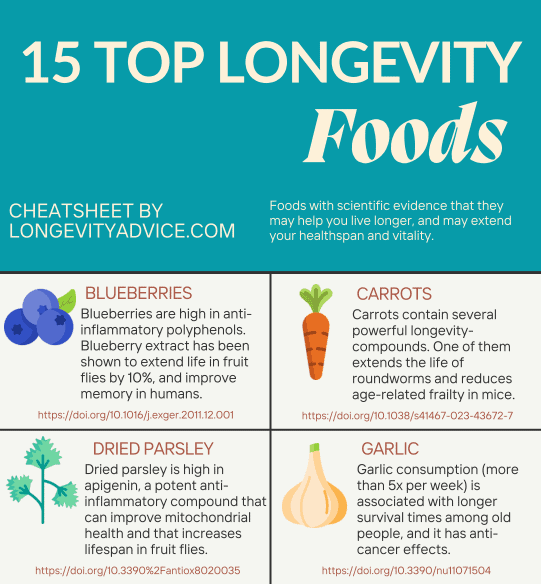As part of our content series exploring the best longevity diet we thought we’d survey our readers to see what their diets were and learn how they thought about the confluence of life extension and food.
We sent a short survey to our email list of spanners (which you can join here if you haven’t yet) and got over 100 responses back (101, to be exact; thanks Mom!).
While our survey falls short of statistical significance, except within a pretty large +/-10% error range, we still found the data super interesting and wanted to share it with you.
The below presents a pretty compelling snapshot of how people interested in the science and practice of longevity think about food, nutrition, meal planning, and nutrient tracking (or not tracking, as you’ll see).

To be clear, we are not statisticians and this is by no means a professional survey, so please keep that in mind when reading our analysis.
Key takeaways
- Almost 87% of respondents claimed to be doing some form of intermittent or multi-day fasting.
- A plurality of 40% of respondents are following the Mediterranean Diet for life extension.
- Only 21% of respondents are tracking their food intake using a dashboard or similar nutrition tracking app.
Affiliate Disclaimer: Longevity Advice is reader-supported. When you buy something using links on our site, we may earn a few bucks.
1. What diet type best represents your dietary approach to longevity?

Of all the topics we cover here at Longevity Advice, diet tends to evoke the widest range of reactions from people interested in human life extension. The responses to this question were similarly varied.
A striking plurality (39.6%) of respondents claim to follow the Mediterranean diet. About 12% follow keto, then vegan (8.9%), vegetarian and paleo (both 6.9%). Three percent of respondents said they follow the Blue Zones diet and two percent of respondents said they follow the carnivore diet. An incredible one in five respondents (20.8%) chose to detail their custom diet plans. Of that subsection of respondents, four claimed to follow no specific diet at all.
There are likely a few factors at play as demonstrated with these responses. First, the Mediterranean diet has extraordinarily varied boundaries—some studies using the Mediterranean diet define it as “Vegetables, fruits, legumes, cereals, fish, and a moderate intake of red wine during meals,” whereas others contain an eight-point checklist, complete with requirements for olive oil, milk, honey, and red meat. Given the Mediterranean diet’s flexibility, it’s not surprising that so many people identify with eating Mediterranean, even though more rigid diets (like carnivore, paleo, and vegan) tend to get more media attention.
No respondent opted to select the “Standard American Diet” as an answer to the survey. Considering the general population likely has much higher adherents to the Standard American Diet, this finding is curious. Reasons for why that might include that respondents could:
- Not know what the Standard American Diet is.
- Prefer to give nuance to their diet in the “other” section (one response was, “I eat everything including red meat but not a lot of red meat”) instead of selecting the Standard American Diet as an option.
- Feel shameful for selecting the Standard American Diet and instead chose a more open-ended diet option (like the Mediterranean diet).
- Have self-selected. Respondents likely to answer a survey about nutrition don’t adhere to the Standard American Diet.
While it’s a possibility that subscribers to Longevity Advice don’t adhere to the Standard American Diet, it would be surprising if that were entirely the case.
2. Do you combine your diet with any type of fasting?

Advocates for intermittent fasting and caloric restriction make some big claims about their effects on longevity, so we were curious if our readership practiced either or both. Users had the option to choose multiple answers.
Unlike the prior question, only 6% of responses filled in their own take on intermittent fasting or caloric restriction. Overwhelmingly, most (72.3%) respondents claim to do daily intermittent fasting. Another 15.8% of respondents said they do occasional multi-day fasts, and 3% of respondents said they do alternate-day fasting. Four percent of respondents say they do a fasting-mimicking diet. Another 6.9% of respondents said they participate in long-term caloric restriction. Finally, 12.9% of respondents said they don’t fast or restrict their calories at all.
Of combined answers, the most popular was daily intermittent fasting combined with occasional multi-day fasts (8.9%).
These findings were not particularly surprising. According to the International Food Information Council’s 2020 Food and Health Survey, one in ten Americans are practicing some form of intermittent fasting, making it America’s most popular eating pattern. Given the diet’s health claims (which have been advocated for by celebrities from longevity influencer Rhonda Patrick to Kourtney Kardashian), it’s no shock so many of Longevity Advice’s readers are doing daily intermittent fasts.
3. Do you prefer to get your protein from animal sources or plant sources?

We asked this question since we were curious how an incredibly health-conscious segment of the population thought about, not just how protein impacts longevity, but the health effects of different protein sources.
The answers here were somewhat surprising, especially given the positive press that plant-based diets like vegetarian and vegan get in longevity circles from places like Harvard Health and Dr. Michael Greger.
While an omnivorous diet mixing meat and vegetable sources of protein got over 46% of respondents, those who said they got protein from mainly meat or mainly plant sources were pretty evenly matched at about 25% to 29%, respectively.
While our own exploration of plant vs. animal protein suggested (as long as you avoid processed red meat) that protein amount was more important than source for longevity purposes, not everyone agrees. So it was interesting to see how evenly divided the plant and animal eaters were in response to this question.
This may be an indication of just how effective the advocates for keto and other low-carb diets have been at getting the word out about their preferred foods over the last few years. It could also be an indication (especially combined with the responses to our first question, above) that omnivorous diets, like the Mediterranean Diet and Blue Zones Diet, have really penetrated the consciousness of folks in the longevity space, notably given the pretty compelling research surrounding their application for healthspan extension.
If we do a follow-up survey we’ll likely ask about not just source, but quantity of protein as well, so see if our readers’ intuitions match up with our own findings.
4. Do you currently use an app or dashboard to track your diet?

This question got tacked on because here at Longevity Advice we really believe in the importance of self-measurement. If you don’t know what’s going into your body, and how it’s impacting your body, you really can’t do much to change or improve your health.
So it was a little disappointing (though not at all surprising) that only ~21% of respondents in our longevity diet survey said they are currently tracking their diet and food intake with some sort of nutrition tracking app or dashboard like Cronometer or MyFitnessPal. Fully 79% said they weren’t using any tracking tool at all.
It’s not surprising that these numbers are so unbalanced, because food tracking is a hassle, even with a streamlined tracking app or tool. If you have some sort of snack while out-and-about (which may not be the best idea for longevity, by the way) you need to remember to add it into the app, and then take the time to search for the relevant item in the app’s database, plugin quantity etc.
Until photo-recognition algorithms get good enough to automatically be able to detect food type, quantity, and brand from a snapshot on your smartphone’s camera, my guess is these numbers aren’t likely to increase. That said, it still represents a pretty big opportunity for any app developers able to crack this nut, especially since such a health-conscious, engaged audience like ours has such small numbers using a meal tracker or food diary.
However, one other possible explanation for such low numbers is that food-tracking is an inherently time-limited activity. Meaning most people only do it for long enough to understand and dial in their diet. Once they feel like they’ve got it down pat they no longer need to track every little thing every day. If you’ve figured out what diet works for you and you stick to it, there’s little sense in recording the same food intake week after week since you won’t be changing anything unless something goes wrong.
Methodology
Longevity Advice collected the information in this diet and life extension survey through its email list between August 6, 2021 and August 25, 2021. The survey included six questions.
Conclusion
According to this survey, a majority of our readers are intermittent fasting and following the Mediterranean diet. A plurality get most of their protein through both plant and animal sources. Only one in five is tracking their food intake.
While this survey was by no means statistically significant, it does point to how the longevity community thinks about nutrition.
Does this survey reflect your own nutritional practices? Do you have any thoughts on the findings? Let us know in the comments below!

I’m the co-founder of Longevity Advice and have been passionate about radical life extension ever since I was a teenager. Formerly I was a content marketing director in the B2B software space. I’m also a sci-fi novelist, wargame rules writer, and enthusiast for cooking things in bacon fat. My sister once called me “King of the Nerds” and it’s a title I’ve been trying to live up to ever since.

By day, I am a problem solver, writer, and the co-founder of Longevity Advice. I’m best known for writing about technology and have been featured in Forbes, The Hill, and TechRepublic. When the batteries are powered down and the suit comes off, I’m an enthusiastic hiker, runner, and Rocket League competitor and enjoy discussing minimalism, Studio Ghibli, and Icelandic sheepdogs.

![What are People Eating to Achieve Human Life Extension? [Original Survey]](https://www.longevityadvice.com/wp-content/uploads/2021/09/Longevity-Diet-Habits-of-Spanners-Original-Survey-Longevity-Advice-1.jpg)
![What are People Eating to Achieve Human Life Extension? [Original Survey]](https://i0.wp.com/www.longevityadvice.com/wp-content/uploads/2021/09/Longevity-Diet-Habits-of-Spanners-Original-Survey-Longevity-Advice-1.jpg?resize=894%2C300&ssl=1)

Intermittent Fasting, OMAD most days and mostly Mediterranean diet. Take vitamins every day and eat a lot of vegetables, salads, beans, and fish a couple times a week.
Thanks for the information, I love your articles.
Thanks Curtis! Sounds like you align with most of our readers. I prioritize fish too.
Pingback: Sugar and Aging: What You Need to Know
Pingback: 13 Best Longevity Experts and Influencers on Twitter - Longevity Advice